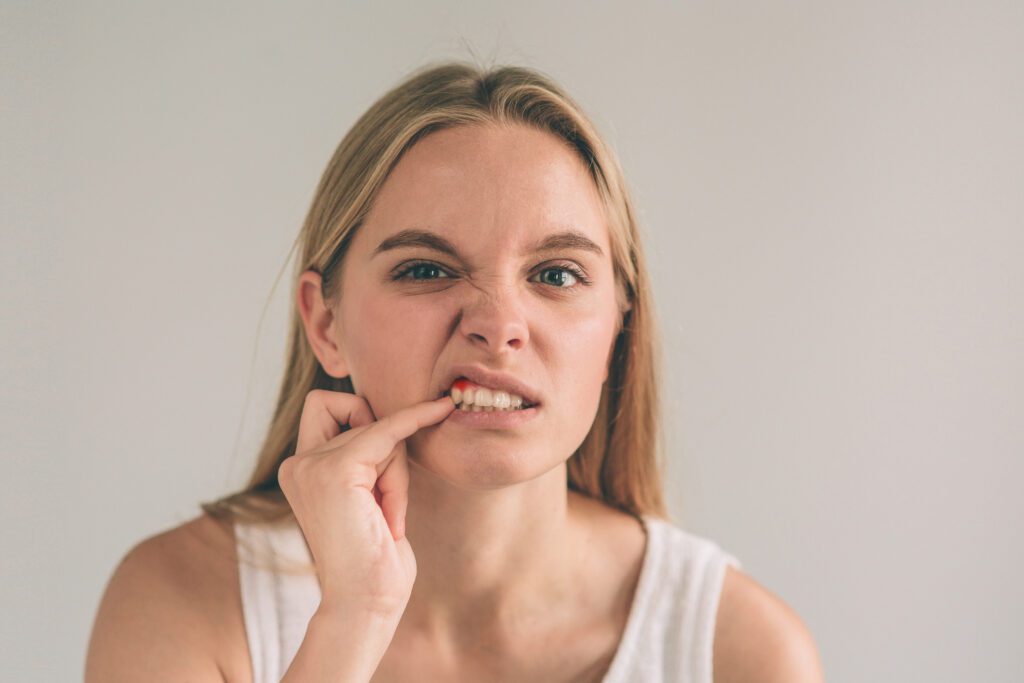Have you ever brushed or flossed your teeth and noticed blood in the sink? If so, you’re not alone. Bleeding gums are a common dental concern and can be a sign that something is wrong. Dr. Rachel Barone treats bleeding gums in Boulder, CO, at Gunbarrel Dental Center. She can help you get your gums back to a healthy state with gentle care and professional treatment.

Why Do My Gums Bleed?
Healthy gums should not bleed. If your gums are bleeding, they’re irritated, inflamed, or infected. Some of the most common reasons why gums bleed include:
Gum Disease
Gum disease is the number one reason most people experience bleeding gums in Boulder, CO. It starts with gingivitis, the early stage of gum disease. Gingivitis happens when plaque, a sticky film of bacteria, builds up along your gumline. If you don’t remove this plaque with daily brushing and flossing, it can make your gums red, swollen, and more likely to bleed.
If gingivitis is not treated, it can become periodontitis, a more serious gum disease. Periodontitis can cause gums to pull away from your teeth, bone loss, and even tooth loss. That’s why it’s so important to treat bleeding gums early before the problem worsens.
Poor Oral Hygiene
Sometimes, bleeding gums are caused by brushing or flossing the wrong way. If you brush too hard or use a toothbrush with stiff bristles, you can damage your gums and make them bleed. Also, if you snap floss into your gums or do it roughly, it can cause small cuts or irritation.
The good news is that you don’t need to brush hard to clean your teeth. A soft-bristled toothbrush and gentle, circular motions are best. When flossing, gently slide the floss between your teeth and curve it around each tooth to clean the sides without hurting your gums.
Not Flossing Regularly
If you’ve gone a long time without flossing and then start again, your gums might bleed for the first few days. This is a normal reaction, and it means your gums are inflamed because of plaque that has been left behind.
With regular flossing, this inflammation will go away, and so will the bleeding. It usually only takes a few days for your gums to adjust and get healthier. Sticking to a daily flossing routine is one of the best things you can do to keep your gums strong and free of infection.
Hormonal Changes
Your hormones can affect your gums just like they affect other parts of your body. Your hormone levels can change during puberty, pregnancy, menstruation, or menopause. These changes can make your gums more sensitive and more likely to bleed, even if you’re brushing and flossing correctly.
Medical Conditions or Medications
Sometimes, bleeding gums are related to a health condition or the medicine you take. For example:
- Diabetes can make it harder for your body to fight infections, including gum infections.
- Blood clotting disorders can make it harder for bleeding to stop.
- Vitamin deficiencies, especially not getting enough Vitamin C or Vitamin K, can weaken your gums and lead to bleeding.
- Blood thinners, like aspirin or other medications, can also make you more likely to bleed, even during gentle brushing or flossing.
If you think your bleeding gums might be related to a health condition or medicine, be sure to tell your dentist and your doctor. Working together, they can help manage the problem and keep your mouth healthy.
Smoking or Tobacco Use
Tobacco weakens your immune system and makes it harder for your body to fight off gum infections. It also slows down healing, so your gums don’t get better as quickly if they’re damaged.
People who smoke are more likely to have gum disease, and they may not even notice it right away. That’s because smoking can mask some signs of gum problems, like bleeding. If you smoke or use tobacco and your gums are bleeding, it’s a good idea to talk to your dentist about ways to quit. Quitting tobacco can make a big difference in your oral and overall health.
Bleeding Gums Treatment in Boulder, CO
If your gums bleed often, don’t ignore the problem. Dr. Rachel Barone will first examine your teeth and gums to find out what’s causing the bleeding. She may check for signs of gum disease, infection, or other health problems. In many cases, Dr. Barone will recommend periodontal disease treatment:
Scaling and Root Planing
This is a deep cleaning treatment for gum disease. If plaque and tartar (hardened plaque) have built up under your gumline, a regular cleaning won’t be enough. Scaling removes the plaque and tartar from your teeth and below the gums. Root planing smooths the roots of your teeth so the gums can heal and reattach to your teeth.
Scaling and root planing is usually done in sections over one or more visits. You may receive a numbing medicine to keep you comfortable during the process. After treatment, your gums should become less swollen, bleed less, and start to heal.
Periodontal Maintenance
If you have had gum disease in the past or have signs of advanced gum problems, you may need cleanings that are more than just twice a year. Periodontal maintenance is a special cleaning done every 3 to 4 months. It helps keep gum disease under control and prevents further damage.
This treatment focuses on cleaning below the gumline, where bacteria hide. By sticking to a regular maintenance schedule, you can keep your gums healthy and avoid more serious dental problems in the future.
How to Stop and Prevent Bleeding Gums at Home
You can do several things in addition to professional care to treat bleeding gums:
- Brush Gently Twice a Day: Use a soft-bristled toothbrush and brush your teeth in small, gentle circles. Don’t scrub too hard. Brushing your teeth helps remove plaque, the sticky layer of bacteria that causes gum disease.
- Floss Every Day: Flossing is just as important as brushing. It removes food and plaque between your teeth and along the gumline where your toothbrush can’t reach. If your gums bleed when you first start flossing, don’t worry. Keep it up, and the bleeding should stop as your gums get healthier.
- Use an Antibacterial Mouthwash: Rinsing with an antibacterial mouthwash can help reduce bacteria in your mouth and lower your risk of gum infections. Dr. Barone can recommend a mouthwash that works well for your needs.
- Eat a Healthy Diet: What you eat affects your oral health. Make sure you get enough Vitamin C and K. You can find vitamin C in citrus fruits, strawberries, and bell peppers. Leafy greens like spinach and kale contain vitamin K. These vitamins help your gums stay strong and healthy.
- Quit Smoking: If you smoke, quitting is one of the best things you can do for your gum health. Tobacco makes it harder for your gums to heal and increases your risk of gum disease.
- Visit the Dentist Regularly: Don’t skip your dental checkups. Regular visits allow Dr. Barone to spot gum problems early and give you the care you need. Early treatment is the key to stopping gum disease before it gets worse.
Schedule a Consultation
Dr. Barone can treat bleeding gums in Boulder, CO. Call us today at 720-881-0614. Feel free to request an appointment with Dr. Barone at Gunbarrel Dental Center online.

